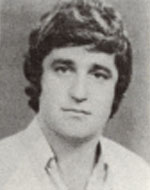Sher, Moshe
Moshe, son of Ida and Ze’ev, was born on January 24, 1946, in Munich, Germany, as the firstborn son of parents of Holocaust survivors, refugees from the Kaunas (Kovno) ghetto in 1947. He began his elementary studies in Jerusalem, After completing his studies at the “Borochov” school, the family moved to Givatayim and continued with high school at the “Kalai” school, where he excelled in humane studies, Who participated in a number of plays that were presented to the audience of students’ families and guests at Beit Zvi Hugh was an active member of the Scouts movement in Ramat Gan and joined the Nahal paramilitary unit Yinon, who had spent a pre-military training period at Kibbutz Ayelet Hashahar. Moshe was drafted into the IDF at the end of July 1964 and assigned to the Nahal Brigade. After completing basic training and completing a parachuting course, he continued to serve as a member of the Nahal Brigade and a member of the Nahal Brigade in Kibbutz Sde Boker, where he completed a course for paramedics. As one of the thinkers of the group and the activists in the company, he became fond of his kibbutz friends and continued to maintain contacts with them for many years afterward. In March 1967, his best friend, Yigal Shamir, was killed in the accident. Moshe did not rest until a book was published in his memory. He helped the kibbutz in editing and publishing the book and also participated in writing about the character of his friend. Moshe was admitted to the Faculty of Humanities at the Hebrew University of Jerusalem. Returning to school and to the city he loved increased his connection and sense of belonging to the city and he established his seat there. For a while he worked for advertising companies to finance his studies, but he found full satisfaction in his work at the Jewish Agency, as assistant to Uzi Narkiss. In the office he met his girlfriend Liora, and the two married at the beginning of September 1973. In his work and personal life Moshe was a man of values and a deep believer in their righteousness. He had an excellent sense of humor and a lot of personal charm. He never tried to patronize others, and his personality radiated quiet confidence, which was a source of inspiration and encouragement to his acquaintances. He had close ties with a wide circle of friends and acquaintances who appreciated his honesty and charm. He was always devoted to his parents and cared for his younger brothers. He was naturally frank, said what was in his Lev and was ready to always feel the help of another. After receiving a BA degree, he decided to move to the University’s Law Faculty, passed the entrance examinations and was accepted for the school year 1974. When the Yom Kippur War broke out, Moshe was sent to the Sinai front with his unit and participated in a series of battles until the day the cease-fire was declared. On the 22nd of Tishrei 5734 (October 22, 1973) Moshe was in the vicinity of the bridges of the IDF’s success in the Suez Canal. In the evening, journalists arrived from Israel and Moshe hurried to send greetings to his parents and wife, which he had given several weeks earlier. When the journalists moved away, a volley of Katyushas landed. In the explosion, Moshe was seriously wounded and died on the way to the hospital. He was laid to rest at the Mount Herzl cemetery in Jerusalem. Survived by his wife, parents and two brothers. After his fall, he was promoted to sergeant. Memorials were published in the booklet “Nizkor” which was published in memory of the fallen of the Hebrew University of Jerusalem and in the booklet “Maabah” – the organ of the Jewish Agency workers’ organization.
